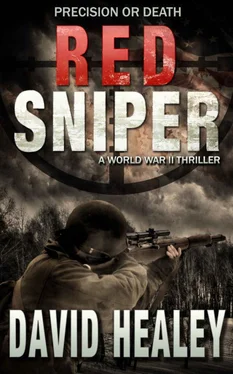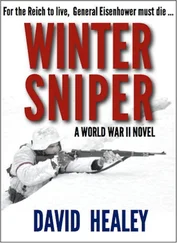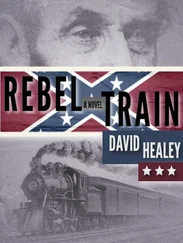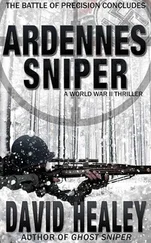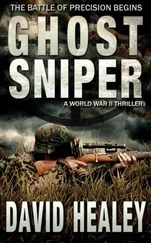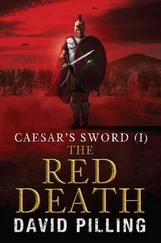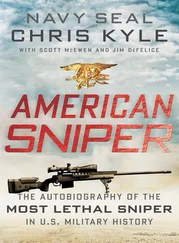“Looks more like a roller coaster ride than a railroad bridge,” Vaccaro remarked.
“There sure as hell won’t be any tanks getting across,” Cole said.
Cole had never been to an amusement park or seen a roller coaster. He had gone straight from the mountains where he had grown up near Gashey’s Creek to basic training, and then on to England and Normandy. He thought that the bridge looked much like the ruins of the old trestle bridge across Gashey’s Creek that the Union army had dynamited during the Civil War. Things being as they were back home, the bridge hadn’t been rebuilt even eighty years later.
Ostensibly, Cole and Vaccaro were helping to guard the bridge against SS units using it for a final dash to the defense of Berlin. That seemed unlikely at this late stage of the war. Now, there were rumors going around that there would be trouble if the Russians tried to cross into American-held territory. The jury was still out on that possibility.
Cole was waiting to see his first Russian, but there were plenty of German refugees. They watched a father wearing a suit and an overcoat, holding a suitcase in one hand and his daughter’s hand in the other. The girl was six or seven. Slowly, they picked their way across the bridge. At one point, they had to wade where the iron rails disappeared below the river’s surface. The little girl lost her footing and was almost swept away by the current. The man dropped the suitcase and grabbed the girl with both hands, struggling to keep her from going under.
Cole, who had faced some of the Germans’ deadliest snipers and dodged bullets and bombs for the last few months, found that his heart was pounding from watching the two try to make it across. He had almost drowned once as a teenager, running a trapline in an icy creek. That experience had left him leery of any kind of water.
He breathed again when the father and daughter made it out of the water. The suitcase had drifted out of reach and was beginning to sink. Their next leg of the bridge was dry, but just as treacherous where missing sections of ties left gaping holes high above the river.
“To hell with this,” Cole said. He handed his rifle to Vaccaro.
“You’ve got that look, Hillbilly. I don’t like it when you get that look.”
“I ain’t gonna stand here and watch, no matter what our orders say.”
“The lieutenant won’t like it.”
“Tell him I went to take a leak and got lost.”
“Cole, what the hell are you up to?”
“You’ll see.”
Cole started down the bank. There were several rowboats down there, battered things, but they had made it across the expanse of river. Refugees had rowed them across, but then abandoned the boats on the bank. Nobody wanted to row back across once they had made it to safety. Meanwhile, desperate refugees crowded the river banks without any way to get across. The boats were all on the wrong side.
Official military policy was that the refugees would not be stopped—not unless they appeared to be Germany military. At the same time, U.S. troops were not to give any active assistance to refugees.
Cole was about to break that rule.
He tied three boats together and clambered into the one that seemed the most seaworthy. There were a couple of oars lying in the bottom, and he took hold of them, trying to figure out what to do next. What Cole knew about boats could fit into his back pocket.
The sound of someone coming down the bank made him look up.
“Those are called oars,” Vaccaro said. “You have to put those in the oarlocks in order to row. Also, it helps if you keep your back toward the bow.”
“The what?”
Vaccaro sighed. “Move over. My uncle has a place at the Jersey shore, so I’ve been in a boat at least once in my life, Hillbilly. I don’t suppose you have much use for boats up there in the mountains.”
“I reckon not.”
With Cole gripping the sides of the rowboat, Vaccaro fitted the oars to the locks, and started rowing, pulling the two other boats in their wake. On the opposite bank, the German refugees saw them coming across and shouted encouragement. “You do know that once some officer spots us doing this, there’s gonna be hell to pay.”
“You think I give a damn?”
“The good news is that all this rowing will get us into shape for breaking rocks at Fort Leavenworth.”
The trip across took just a couple of minutes. Cole had worried that there would be a ruckus over who got into the boats, but to his surprise, the refugees were very orderly.
A couple of men had taken charge and were forming people into lines, keeping families together. Cole thought that the organizers, with their military bearing and close-cropped hair, looked suspiciously like German officers, but they wore civilian clothes. They seemed used to giving orders.
The boats filled quickly. Suitcases were abandoned in favor of fitting more people—the refugees carried only what they could hold in their arms. Cole got into the second rowboat, noticing that a few inches of river water sloshed in the bottom from some unseen leak. He just hoped the damn thing didn’t sink on him.
He counted eighteen Germans spread across the three boats. Cole didn’t like the fact that with so many passengers, his rowboat now sat low in the water, but fortunately the river was smooth and calm. He put his back into pulling the oars, eager to cross the expanse of river. However, the trip back to the western shore took longer because of the weight.
On the American side of the Elbe, the passengers disembarked in orderly fashion. A handful still had relatives on the opposite bank. They looked imploringly at the two GIs.
Cole settled back down and took up the oars. “If I keep this up long enough, maybe they’ll let me join the navy.”
“We’re going back?” With a sigh, Vaccaro reached for his own set of oars. “I guess we can’t leave the job half done.”
They rowed to the other side and loaded the boats again. The Germans jabbered at them, and although neither man spoke the language, it was plain that the refugees were thankful. Someone tried to give Cole a roll of money, but he shook his head and muttered, “ Nein.”
On their fourth trip across, he did accept a bottle of schnapps from an old man, mainly because the poor codger seemed so excited to give it to him. Cole nodded his thanks and tucked the bottle into what he had learned from Vaccaro was called the bow.
The water was getting deeper in the belly of his rowboat. One of the German organizers on the bank noticed and produced an empty tin can. He jumped in and started scooping out water.
Cole was built lean and rangy, which was good for covering ground, but not for rowing heavy boats back and forth across the muddy Elbe. His hands were far from soft, but he didn’t have the leathery skin of a farmer. By the fifth trip he had blisters. By the eighth trip his hands were bloody. On the tenth trip, a beautiful blond woman, dressed in fashionable clothes, noticed the blood where he gripped the oars. She took his hands, making tsk , tsk sounds of sympathy. She had eyes the color of a blue sky and looked as if she had just stepped off a movie screen. She tore strips from the hem of her dress and then gently wrapped his hands. He went back to the oars.
Now the number of Germans waiting to cross was not diminishing, but growing. Where the situation had been almost hopeless before, now Germans were being drawn to possibility of escape. Previously, the Germans had been calm, but there was a new urgency in those waiting for the boats. He overheard the words die Russen repeated again and again, clearly in an apprehensive tone. Did that mean the Russians were closer?
There seemed to be some confusion about who was getting into which boat, and what they were taking with them.
Читать дальше
